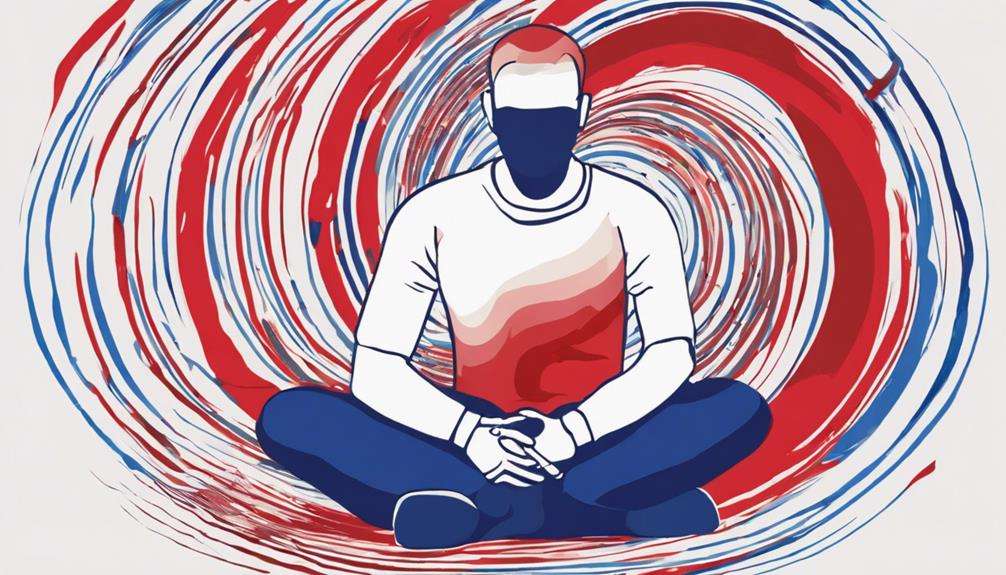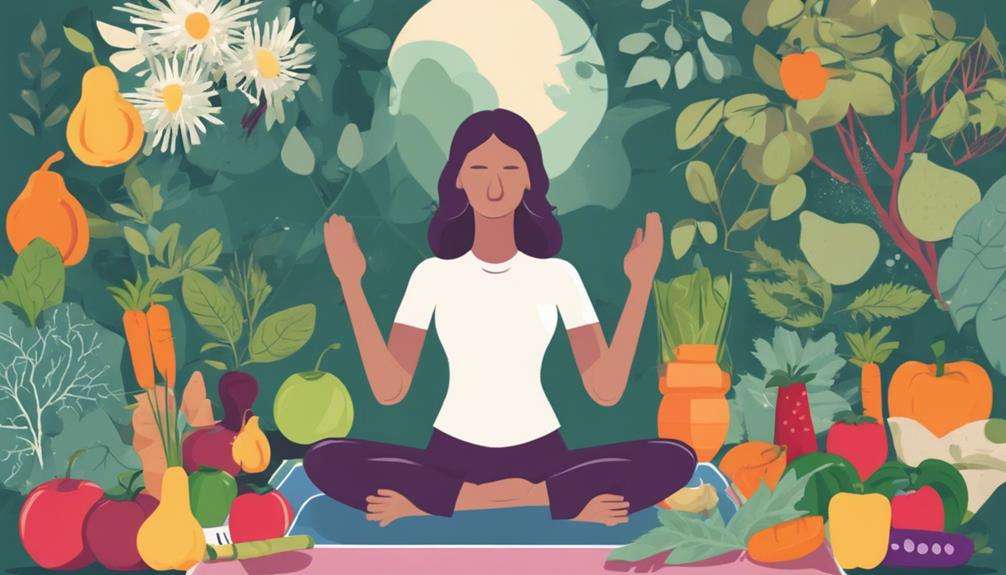Imagine your body as a finely tuned instrument, each string playing an important role in harmony. Just like when one string is out of tune, your blood pressure can throw off the symphony of your health.
But fear not, for there are ways to bring back the perfect harmony. What if you could discover the key to relaxation and lowering blood pressure, accessing a world of well-being and vitality?
Key Takeaways
- Practice yoga, meditation, and deep breathing for stress relief and blood pressure control.
- Maintain a balanced diet, exercise regularly, and stay hydrated for optimal blood pressure levels.
- Incorporate relaxation techniques into daily routines to naturally manage and reduce high blood pressure.
- Seek guidance from healthcare providers for effective stress management strategies to promote heart health.
Understanding Blood Pressure Basics
Understanding the basics of blood pressure is essential for maintaining overall health and well-being. Blood pressure refers to the force of blood on artery walls, measured by systolic and diastolic pressure readings.
High blood pressure, considered above 130/80, poses risks such as heart disease and stroke. To lower high blood pressure, it's vital to control stress levels, which can help reduce the strain on your heart and lower the risk of complications. Monitoring and managing stress effectively can contribute to maintaining a healthy blood pressure level.
Lifestyle Factors Affecting Blood Pressure
To effectively manage your blood pressure, paying close attention to lifestyle factors such as diet, exercise, stress management, and hydration is essential. Maintaining a healthy weight through a balanced diet and regular exercise routine is important for blood pressure control.
Stress management techniques like meditation and relaxation can greatly lower high blood pressure levels. Adequate hydration by drinking recommended amounts of water daily is important in regulating blood pressure.
Lifestyle changes such as reducing salt intake, limiting caffeine consumption, and staying physically active can effectively help in lowering blood pressure. By incorporating these habits into your daily routine, you can positively impact your blood pressure levels and overall health.
Importance of Stress Management

Managing stress levels is key to lowering blood pressure and reducing the risk of heart disease and other complications associated with hypertension. Stress management techniques, such as relaxation, meditation, and deep breathing exercises, play an important role in promoting a relaxation response that can help in reducing blood pressure levels.
Chronic stress can lead to hypertension as it triggers hormonal changes that increase heart rate and constrict blood vessels, contributing to elevated blood pressure. Engaging in activities like yoga, progressive muscle relaxation, and mindfulness meditation can effectively reduce stress levels and support healthy blood pressure management.
Additionally, ensuring adequate sleep, regular physical activity, and seeking social support are essential components of stress management that positively impact blood pressure levels. By incorporating these strategies into your daily routine, you can effectively manage stress, lower your blood pressure, and reduce the risk of heart disease associated with hypertension.
Benefits of Healthy Diet Choices
Choosing a diet rich in fruits, vegetables, whole grains, and lean proteins offers significant benefits for lowering blood pressure and promoting overall heart health. The DASH diet, known for its effectiveness, can reduce blood pressure by up to 14 mmHg systolic and 8 mmHg diastolic.
To further support healthy blood pressure levels, it's critical to limit sodium intake to less than 2,300 mg per day, or even 1,500 mg for individuals with hypertension. Cooking at home empowers you to manage sodium levels in your meals more effectively, contributing to better blood pressure control and improved heart health.
Including potassium-rich foods such as bananas, sweet potatoes, and spinach in your diet can counteract the adverse effects of sodium on blood pressure. Additionally, opting for heart-healthy fats from sources like avocados, nuts, and olive oil can help maintain lower blood pressure and support overall cardiovascular well-being.
Make conscious choices to include these beneficial elements like fruits, vegetables, whole grains, and lean proteins in your daily meals for best heart health.
Impact of Physical Activity on Blood Pressure

Regular physical activity plays an important role in managing blood pressure. It strengthens the heart and eases pressure on arteries. Engaging in exercises also helps in weight control, which is essential for hypertension management. Aim for at least 150 minutes per week of moderate-intensity activities as recommended by health experts.
It is crucial to incorporate regular exercise into daily routines to maintain a healthy blood pressure level.
Exercise and Hypertension
To effectively manage hypertension, consider the impact of physical activity on blood pressure. Exercise plays an essential role in lowering high blood pressure by strengthening the heart and improving cardiovascular health. Engaging in regular physical activity not only helps with blood pressure control but also contributes to weight management, stress reduction, and promoting relaxation.
The American Heart Association recommends at least 30 minutes of exercise most days of the week for managing blood pressure effectively. Activities like yoga, brisk walking, running, or cycling can all have a significant effect on your blood pressure levels. Consistent physical activity can lead to long-term benefits in reducing blood pressure and improving overall well-being.
Start incorporating exercise into your routine to reap these advantages.
Benefits of Movement
Movement is a powerful tool for positively impacting blood pressure levels through its ability to strengthen the heart and enhance cardiovascular health. Physical activity, such as walking or biking, aids in maintaining a healthy weight and reducing high blood pressure.
The American Heart Association recommends at least 150 minutes of moderate-intensity exercise weekly to lower blood pressure. Exercise not only strengthens the heart and improves blood flow but also releases endorphins, reducing stress and anxiety – both risk factors for high blood pressure.
Role of Natural Supplements
Natural supplements play a significant role in aiding the lowering of blood pressure levels.
Garlic, known for its cardiovascular benefits, can reduce blood pressure and improve arterial stiffness.
Omega-3 fatty acids are crucial for heart health and can support the reduction of blood pressure.
Magnesium, an essential mineral, is a natural supplement that also aids in lowering blood pressure levels.
In addition to these supplements, alternative therapies such as acupuncture, massage, and yoga have been shown to help lower blood pressure by reducing stress and promoting relaxation.
These natural supplements and alternative therapies can complement lifestyle changes in managing high blood pressure effectively.
Exploring Alternative Therapies

Discover how alternative therapies such as acupuncture, massage, and yoga can effectively lower blood pressure by promoting relaxation and reducing stress.
Acupuncture targets specific points on the body to manage high blood pressure, while massage therapy helps by easing muscle tension and inducing relaxation.
Yoga, with its focus on meditation and breathing exercises, not only enhances cardiovascular health but also aids in lowering blood pressure.
Integrating these alternative therapies with lifestyle changes can greatly improve blood pressure management strategies. By incorporating practices that target stress reduction and relaxation, individuals can experience a holistic approach to enhancing their overall well-being.
These alternative therapies offer natural ways to support cardiovascular health and reduce blood pressure levels, providing additional tools for individuals seeking to optimize their health through non-invasive methods.
Embracing alternative therapies alongside conventional treatments can lead to a more inclusive and effective approach to lowering blood pressure and improving overall health.
Yoga for Blood Pressure Regulation
Yoga provides a variety of poses and breathing techniques that can help regulate your blood pressure. These poses and techniques aim to reduce stress, improve flexibility, and enhance cardiovascular health.
Yoga Poses for BP
Exploring specific yoga poses tailored for blood pressure regulation can greatly aid in stress reduction and overall cardiovascular health. Poses like Savasana, Balasana, and Sukhasana are known to lower blood pressure and reduce stress.
Inverted poses such as Viparita Karani and Setu Bandhasana promote relaxation and enhance blood circulation. Practicing yoga regularly with poses like Uttanasana and Adho Mukha Svanasana can calm the mind, reduce anxiety, and contribute to lower blood pressure levels.
Incorporating poses like Bhujangasana and Anjaneyasana into your routine can improve heart health, manage hypertension, and support overall well-being. Consistent practice of these yoga poses can be beneficial for maintaining a healthy blood pressure and a relaxed state of being.
Breathing Techniques for BP
Enhancing your blood pressure regulation through specific breathing techniques in yoga can lead to significant improvements in your overall cardiovascular health and stress management.
Breathing techniques, such as pranayama and diaphragmatic breathing, play a pivotal role in regulating blood pressure by promoting relaxation and reducing stress. These controlled breathing exercises not only lower heart rate but also help decrease systolic blood pressure levels.
Yoga practices that focus on deep breathing and mindful awareness enhance the activity of the parasympathetic nervous system, leading to a reduction in blood pressure. Studies have shown that regular yoga sessions incorporating these breathing techniques can effectively lower both systolic and diastolic blood pressure levels, improving overall cardiovascular health and inducing a calming effect on the body and mind.
Meditation Techniques for Relaxation

Are you curious about how meditation techniques can effectively induce a relaxation response that aids in lowering high blood pressure?
Meditation practices such as mindfulness and transcendental meditation have been shown to prompt a relaxation response that can be beneficial for managing high blood pressure and stress-related disorders.
Regular meditation sessions, lasting around 10-20 minutes twice a day, have been linked to reducing inflammation, widening blood vessels, and decreasing stress-related issues.
Mindfulness meditation specifically helps in stress management, enhancing emotional well-being, improving focus and concentration, and promoting relaxation.
On the other hand, transcendental meditation is known for inducing a deep relaxation response that effectively reduces high blood pressure and stress-related disorders.
Combining meditation with breathing exercises and mental imagery can further enhance the benefits, aiding in lowering blood pressure and promoting overall well-being.
Practice these meditation techniques consistently to experience the positive effects on your health.
Final Thoughts on Blood Pressure Wellness
To wrap up considerations on blood pressure wellness, incorporating relaxation techniques into your daily routine can highly contribute to maintaining best blood pressure levels naturally. Stress management plays an important role in blood pressure management, and relaxation techniques such as mindfulness meditation and progressive muscle relaxation have been shown to effectively lower blood pressure. These practices promote the relaxation response, reduce stress, and improve overall cardiovascular health.
It is essential to combine these relaxation methods with lifestyle changes like regular exercise and proper hydration for a thorough approach to managing high blood pressure. Engaging in stress-reducing activities not only benefits blood pressure levels but also enhances sleep quality and overall well-being. Seeking guidance from healthcare providers on suitable relaxation techniques and lifestyle modifications is crucial for successful blood pressure management. By integrating these strategies into your daily routine, you can take proactive steps towards better blood pressure control and improved overall health.
Frequently Asked Questions
How to Lower Blood Pressure Through Relaxation?
To lower blood pressure through relaxation, start with simple breathing exercises. Try meditation techniques, mindfulness, and progressive relaxation. Incorporate yoga poses, guided imagery, stress management, and self-care routines. Practice positive affirmations for a calmer mind and body.
How Do I Calm Myself Down for Blood Pressure Reading?
To calm down for a blood pressure reading, practice deep breathing, mindfulness exercises, muscle relaxation, and visualization methods. Manage stress with meditation, progressive relaxation, and guided imagery. These techniques help relax your mind and body.
What Is the Blood Pressure Release Trick?
To lower blood pressure quickly, try the Blood Pressure Release Trick. It involves specific breathing patterns for stress relief. Practice deep breathing, mindfulness, and progressive relaxation to promote calm. Use visualization, yoga, meditation, and muscle relaxation for benefits.
Will My Blood Pressure Go Down if I Relax?
Can relaxation lower blood pressure? Absolutely! Implement stress management techniques like deep breathing and muscle relaxation. These practices enhance the mind-body connection, promoting mental health and decreasing hypertension. Consistent use leads to long-term benefits.
Conclusion
You've learned how important it's to manage your blood pressure through relaxation techniques and lifestyle changes. Did you know that high blood pressure affects nearly half of all adults in the United States?
By incorporating these strategies into your daily routine, you can take control of your health and reduce your risk of heart disease and stroke. Remember, a little effort now can lead to a healthier, happier future.






